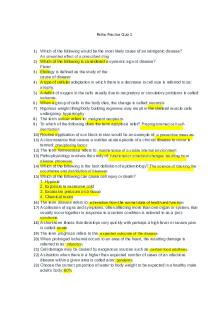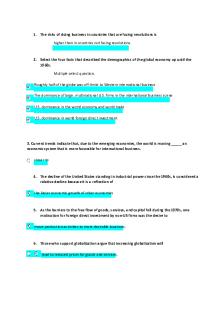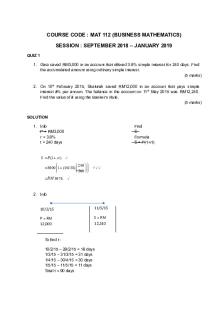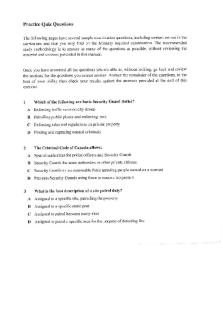American history quiz 1 practice PDF

| Title | American history quiz 1 practice |
|---|---|
| Course | History Fundamentals |
| Institution | San José State University |
| Pages | 12 |
| File Size | 100.2 KB |
| File Type | |
| Total Downloads | 7 |
| Total Views | 178 |
Summary
practice for quiz 1...
Description
Reformer, 1965-20 The In the 19th and late 20th centuries, even though most women did not work after they got married, it is conditional that these women are maids, servants, cooks, domestic servants of wealthy households, or the clothing/textile industry (Triangle shirt factory) fire), is a teacher or a cigar maker. Women are the least likely to work for doctors and lawyers—unless you are a Blackwell sister—other, the first female doctor and lawyer.
Muller v. Oregon (1908) - The law protecting women workers is indeed constitutional
move Jane Addams - The establishment of a hull house (1889) in Chicago is part of the relocation of settlements to help the out-of-town urban poor, especially immigrant women.
Scandal whistleblower The Ida Tarbell, one of the authors of a series of research papers on research papers, was originally published in the McClure magazine, Oil's Trust in Standard Oil. These papers were later placed in a book called The History of Standard Oil (1904), which revealed its erroneous practices and negative impact on society.
Voting rights Wyoming Territory (1869) - Allow women to vote. A greater chance in the west. Jeanette Rankin - The first woman to be elected is a representative of Montana, and Montana allows women to vote in the state. During the Second World War, I was considered a pacifist in the waste paper house (1916-1918), because she voted against the resolution to participate in the war.
Amendment to Article 19 (1920) - Women's right to vote.
Moderation movement Christian women's temperance union. The head of the group is the Kerry nation, who will go to the bar with a woman with an axe to destroy it. The slogan of the prolific bar is: "We serve every country, in case Carrie."
Success: Article 18 Amendment - Prohibited
Civil rights Well (the person who helped find nap) fight for anti-private criminal law. Ap test authors like to take women to participate in the test. The Association of Women of Nationality of Colored Women - Women’s right to vote is the main issue.
Helen Hunt Jackson - helping individuals with little effort. This man wrote a Remark Brue woman around nat. "A dishonest century" (1881) describes our government's horror treatment of Nat am - forcing them to leave the land - ap test needs to be balanced - the percentage of questions about women, ethnic minorities, etc. People do not like to read the facts and numbers. Wrote a novel called Ramona (1884), a girl from San Diego, California, who faced herself and her injustice, like Uncle Tom's hut.
I am a world war myself. Since men’s participation in the war, women have found more opportunities in the workplace. This was supported by women’s suffrage and eventually passed the 19th amendment in 1920. Although the Women’s Senate’s war to protect female workers in war was later than war, most women were given jobs at the end of the war, and the National Assembly even confirmed that it provided traditional support for women in the Sheppard-towner maternity leave in 1921. This is a federally funded education in maternal and infant health care.
Adkins children the Hospital (1923) - The Supreme Court overturned its own conclusions in the muller Oregon case. It is said that a woman’s grocery case requires special protection in the workplace. Adkins’s decision to eliminate women’s protection at work was wiped out and the women’s minimum wage law was erased. This is mainly the result of women’s access to the 19th amendment. People think they are equal.
When questioned: What is the main role of a woman and when did it happen at the end of the 19th century? Did this approach take this change during the First World War?
Early tariffs and panic
Protective tariffs in 1816 This kind of tariff was after the war of 1812, the wave of creation of nationalism, and the resulting war of origin. For the American system of Henry Clay, this is a bitten part. Tariffs protect the manufacturing industry (baby industry) because those who compete for the British textile industry have jumped over to Americans in the past 50 years.
Panic in 1819 Excessive speculation on the land originated from the Wildcat Bank in the west. Our bank forced Western banks to borrow, resulting in countless farms being foreclosed. This helps the crisis cause dissatisfaction among the peasants and helps to stimulate Jacksonian democracy.
Protective tariffs in 1824 The tariff is a high appreciation tariff of 1816, designed to help protect the baby industry of British manufacturers of American origin. This is the first major example of departmentalism. The prolific southerners appreciate the Calhoun appearance protection tariff for this equipment, which benefits the south, while the North benefits from the foreign manufactured goods and opens foreign markets for their cotton, thus benefiting the North.
Panic of 1837 The root cause of this phenomenon is that this enthusiasm has prompted people to get rich. The gamblers on the western land borrowed money from the Wildcat Bank to build railways, canals, roads and slaves. Jackson killed the bus earlier and sent the federal reserve to the state and Wildcat Bank. Seeing when the speculators themselves created the currency encirclement (1836), every public must buy it in hard currency.
Panic of 1857 The panic began to make the Ohio Bank lose confidence, prevent it from spreading to the railroad, and feared that the US federal government would not be responsible for the debts paid in kind. More than 5,000 American companies closed that year.
Panic of 1873 Leading to excessive speculation on the planet, mines, factories and farms, the market cannot afford. The bank issued a large amount of loans, when the profits failed, the loans were not repaid, and the bank failed.
McKinley Tariff (1890) The highest tariff in peacetime – 48%. Protective tariffs hurt farmers because it drives up the price of agricultural equipment and fails to stop the fall in agricultural prices. The panic of 1893 - very similar to the 1873 panic, which had too many speculative activities on railways and mines and took over several companies to take over. Farmers in the Midwest have been hit hard by the drought, regaining their free, free silver. The McKinley tariff was the only cause of panic in 1893.
Customs PowerPoint slides are the same for women
Gilded Age, 1877-1900 19. Rutherford B. Hayes, 1877-1881, Republican. VP - Wheeler Major Items: • Bland-Allison Act, 1878 (free coinage of silver. • Troops withdrawn from the South, 1877
20. James A Garfield, March 4 to September 19, 1881, Republican VP - Chester A. Arthur
Secretary of State - James A. Blaine Major Items: • Assassinated by C. Julius Guiteau
21. Chester A. Arthur, 1881-1885, Republican Secretary of State - James A. Blaine Major Items: • Pendleton Act, 1883 (set up civil service commission)
22. Grover Cleveland, 1885-1889, Democrat VP - Hendricks Major Items: • Knights of Labor, 1886 • Haymarket Riot, 1886 • Interstate Commerce Act, 1887 • Washburn v. Illinois, 1886
23. Benjamin Harrison, 1889-1893, Republican VP - Morton Secretary of State - James A. Blaine Major Items: • Sherman Anti-trust Act, 1890 • Populist Party Platform, 1892 • North Dakota, South Dakota, Montana, Washington become states, 1889 • Idaho and Wyoming become states, 1890 • McKinley Tariff, 1890
• Sherman Act, 1890
24. Grover Cleveland, 1893-1897 Second Administration (only President to serve two non-consecutive terms) Democrat VP - Stevenson Major Items: • Panic of 1893 • Hawaiian incident, 1893 • Venezuelan Boundary Affair, 1895 • Pullman Strike, 1894 • American Federation of Labor • Wilson-Gorman Tariff, 1894
25. William McKinley, 1897-1901, Republican VP - Garret Hobart, 1896-1900 VP - Theodore Roosevelt Secretary of State - John Hay Major Items: • New Imperialism • Spanish-American War, April 1898 - February 1899 • Open Door Policy, 1899 • Boxer Rebellion, 1900 • McKinley was assassinated by Leon Colugos, 1901
Progressive Age, 1900-1920
26. Theodore Roosevelt, 1901-1908, Republican VP - Fairbanks
Secretary of State - John Hay, Elihu Root Major Items: • Panama Canal, 1903-1914 • "Square Deal" • Corollary to the Monroe Doctrine, 1904 • Portsmouth Treaty, 1905 • Gentleman's Agreement with Japan, 1904 • Hague Conferences, 1899 and 1907 • Hepburn Act, 1906 • Pure Food and Drug Act, Meat Inspection Act, and "muckrakers", 1906 • Political reforms of the Roosevelt Era • Trust-busting • Coal Strike • Conservation • Venezuelan Debt Controversy, 1902 • Dominican Republic Crisis, 1902 • Algerian Conference over Morocco, 1906
27. William Howard Taft, 1909-1913, Republican VP - Sherman Major Items: • Paine-Aldrich Tariff, 1909 • Pinchot-Ballinger controversy, 1909 (conservation v. reclamation) • "Dollar Diplomacy"
28. Woodrow Wilson, 1913-1921, Democrat
VP - Marshall Major Items: • Underwood Tariff, 1913 • 16th, 17th, 18th, and 19th Amendments • Federal Reserve System, 1913 • Glassier Act, 1913 • Federal trade Commission, 1914 • Clayton Anti-trust Act, 1914 • Troops to Nicaragua, Dominican Republic, Haiti, Virgin Islands, Mexico • The Lusitania, May 1915 • "Fourteen Points," January 1917 • Treaty of Versailles, 1919-1920 • "New Freedom"
Roaring Twenties, 1920-1929
29. Warren G. Harding, 1921-1923 "Dark Horse" candidate Republican VP - Calvin Coolidge Secretary of State - Charles Evans Hughes Major Items: • Teapot Dome Scandal • Washington Conference, 1921-1922 • Myocardia Tariff, 1922
30. Calvin Coolidge, 1923-1929, Republican VP - Dawes
Secretary of State - Frank Kellogg Major Items: • Kellogg-Briand Pact, 1928
31. Herbert Hoover, 1929-1933, Republican VP - Curtis Secretary of State - Henry L. Stimson Major Items: • National Origins Immigration Act, 1929 • Panic and Depression • Stock market Crash, 1929 • Hawley-Smoot tariff, 1930
Detente and Rapprochement, 1968 - present
37. Richard M. Nixon, 1968-1974, Republican VP - Spiro Agnew, Gerald Ford Major Items: • "Imperial Presidency" • Landing on the moon, July 1969
• Warren Burger, Chief Justice, 1969 • Woodstock, August 1969 • Environmental Protection Agency (EPA) established, 1970 • 16th Amendment, 1971 • Visit to China, February 1972 • Visit to Russia, May 1972 • Strategic Arms Limitation Treaty (SALT), 1972 • Kissinger and "shuttle diplomacy," 1973-1975 • Wounded Knee, South Dakota, 1973 • Allende regime in Chile overthrown with the help of the CIA, September 1973 • Agnew resigns, 1973 • Nixon resigns, August 9, 1974 • Pentagon Papers, August 30, 1971 (superior court allows the NY Times to publish)
38. Gerald Ford, 1974-1976, Republican 1st appointed President VP - Nelson Rockefeller Neither President nor Vice-President had been elected Major Items: • Pardons Richard Nixon • OPEC crisis, 1974
39. Jimmy Carter, 1977-1981, Democrat VP - Walter Mondale Major Items: • Panama Canal Treaty signed, September 1977
• Established diplomatic relations with China and ended recognition of Taiwan • Three-Mile Island Incident, March 1979 (nuclear reactor leak in Pennsylvania) • Egypt and Israel peace treaty; Sadat and Begin win the Nobel Prize, 1979 • Iran Hostage Crisis, 1979 (rescue attempt, 8 killed, April 1980) • Seizure of Afghanistan by Soviets, 1979 • "Stagflation" • Boycott of Olympics in Moscow to protest invasion of Afghanistan
40. Ronald Reagan, 1981-1989, Republican VP - George Bush Major Items: • Hostages returned • Falkland Islands Crisis, 1982 (U. S. supports England) • 1500 Marines sent to Beirut, 1983; withdrawn in 1984 • Grenada, October 1983 • Nicaragua, 1984 • Sandra Day O'Connor, first woman appointed to the Supreme Court • "Supply-side economics" • Iran-Contra Hearings, Summer 1987 (Oliver North)
41. George Bush, 1989- 1993, Republican VP - Dan Quayle Major Items: • Savings and Loan Scandal, 1990 • Berlin Wall came down leading to the reunification of Germany • Invasion of Panama, 1990
• Operation Desert Shield and Desert Storm (the Gulf War), January to August 1992
42. Bill Clinton, 1993-2001, Democrat VP - Al Gore Major Items: • North American Free Trade Agreement (NAFTA), 1993 • Proposes a national health care system, 1993 • Participates in air strikes in Bosnia, 1994 • Participates in air strikes in Iraq • Sex scandal, 1998 • Participates in air strikes on Serbia, 1999...
Similar Free PDFs

American history quiz 1 practice
- 12 Pages

American- History-X pelicula
- 4 Pages

American History X
- 11 Pages

Sample Quiz #1 - Practice Quiz
- 2 Pages

American History - Grade: A
- 5 Pages

Patho Practice Quiz 1
- 5 Pages

Chapter 1 - quiz practice
- 5 Pages

HW 1 - Quiz Practice
- 7 Pages

Practice Quiz 1
- 2 Pages

QUIZ 1 MAT112 Practice
- 2 Pages

Practice Quiz 1 - Exam
- 24 Pages

Practice Quiz 1
- 11 Pages

World History Quiz 1 Notes
- 2 Pages

American History Unit 2 Notes
- 8 Pages

American Revolution quiz
- 2 Pages
Popular Institutions
- Tinajero National High School - Annex
- Politeknik Caltex Riau
- Yokohama City University
- SGT University
- University of Al-Qadisiyah
- Divine Word College of Vigan
- Techniek College Rotterdam
- Universidade de Santiago
- Universiti Teknologi MARA Cawangan Johor Kampus Pasir Gudang
- Poltekkes Kemenkes Yogyakarta
- Baguio City National High School
- Colegio san marcos
- preparatoria uno
- Centro de Bachillerato Tecnológico Industrial y de Servicios No. 107
- Dalian Maritime University
- Quang Trung Secondary School
- Colegio Tecnológico en Informática
- Corporación Regional de Educación Superior
- Grupo CEDVA
- Dar Al Uloom University
- Centro de Estudios Preuniversitarios de la Universidad Nacional de Ingeniería
- 上智大学
- Aakash International School, Nuna Majara
- San Felipe Neri Catholic School
- Kang Chiao International School - New Taipei City
- Misamis Occidental National High School
- Institución Educativa Escuela Normal Juan Ladrilleros
- Kolehiyo ng Pantukan
- Batanes State College
- Instituto Continental
- Sekolah Menengah Kejuruan Kesehatan Kaltara (Tarakan)
- Colegio de La Inmaculada Concepcion - Cebu
